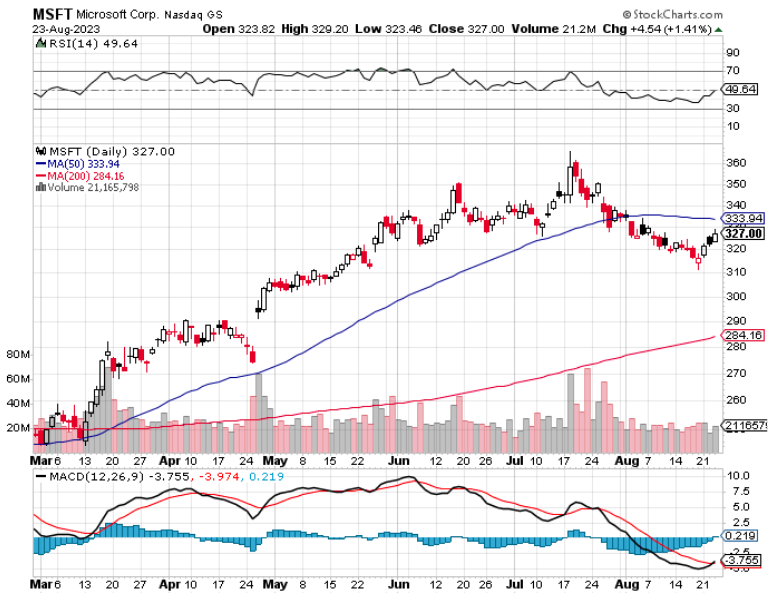BRIDGING BYTES AND BIOLOGY
(MSFT), (AAPL), (GOOGL), (AMZN), (CRM)
In the span of just nine months, the world of artificial intelligence (AI) has seen significant shifts. From the initial excitement of innovations like ChatGPT to more recent controversies, AI’s journey has been nothing short of captivating.
While early missteps, such as Bing’s ex-chatbot Sydney’s quirky declarations, raised eyebrows, the broader implications of AI have caught the attention of industry and government alike.
With all the conversations about potential regulations and concerns about AI affecting job markets, one might think that the enthusiasm for the technology would slow down. On the contrary, the adoption of AI in software and daily applications is advancing at an astonishing pace.
One sector emerging as the epicenter of this evolution is the workplace, and surprisingly, Microsoft (MSFT) is leading the charge.
A few years back, many would not have predicted Microsoft's dominance in the AI space. Yet, with a strategic investment of $13 billion, Microsoft's partnership with OpenAI has redefined its trajectory. This alliance has enhanced platforms like GitHub and Azure, giving Microsoft a competitive edge against giants like Amazon and Google.
Microsoft’s ascent in the AI sphere isn’t a sudden leap; it’s the result of deliberate strategizing and innovation.
Their journey feels like an endurance race, with the company accelerating dramatically in recent months. While the dream of AI traces back to a 1956 Dartmouth College workshop, Microsoft was already exploring AI's potential by 1991 through its innovation hub, Microsoft Research.
Despite a somewhat muted impact in the early days, Microsoft's rejuvenated strategy focused on humility, daring, and innovative leaps into areas like cloud computing.
Strategic acquisitions, such as LinkedIn and GitHub, further positioned Microsoft as a formidable player. The result? A growth from a $300 billion market value to an impressive $2.5 trillion.
Generative AI might hold the key for Microsoft to surpass even the $3 trillion mark, a threshold currently only achieved by Apple (AAPL). McKinsey's projections suggest that such technology could boost the global economy by $2.6 trillion to $4.4 trillion annually by enhancing everyday operations.
While tech stalwarts like Amazon (AMZN), Google (GOOGL), and Salesforce (CRM) are quickly integrating this technology, Microsoft's diverse tech offerings place it in a dominant position.
Healthcare, a sector urgently seeking the benefits of AI, sees a promising partnership between Microsoft and Epic. Their combined strategy utilizes Microsoft’s robust cloud and AI capabilities and Epic’s comprehensive knowledge of healthcare systems. Their collaborative aim is to embed conversational, ambient, and generative AI into Epic’s electronic health records. This initiative aims to transform patient care, streamline operations, enhance healthcare experiences, and solidify the financial foundation of healthcare institutions.
In their joint venture, Epic and Microsoft have unveiled tools like the advanced Note Summarization tool built on the AI-enhanced Epic In Basket, tailored to enhance physician and nurse productivity. By facilitating quicker documentation and offering AI-powered text suggestions, this tool promises to revolutionize healthcare documentation.
Furthermore, an improved version of Nuance's Dragon Ambient eXperience (DAX) tech is now integrated with Epic’s platforms, ensuring a more fluid workflow experience. On the administrative side, the partnership promises transformative shifts in revenue cycle management.
Through the elimination of manual processes, Epic's new AI solution introduces smart medical coding suggestions, streamlining and heightening the precision of billing procedures.
With Azure OpenAI taking the lead, Epic is also delving deep into clinical research, striving to bridge clinical evidence gaps and provide insights into rare diseases.
This integration of Azure OpenAI and Nuance's technologies within Epic underscores the transformative potential when tech behemoths collaborate. Such partnerships hold the promise of innovative AI solutions that can reinvent industries for the betterment of society.
However, it's crucial for investors to look beyond just the promise and understand the landscape.
By 2025, the U.S. could face a shortage of nearly 90,000 physicians. Additionally, the rising trend of clinician burnout is concerning.
On the operational front, almost 25% of national health expenditure is directed toward administrative costs—a significant portion that AI could optimize.
Recent discussions, like those between the UPMC Center for Connected Medicine and KLAS Research, underscore the healthcare industry's pressing need for AI. From enhancing diagnostic imaging to patient engagement, AI's potential is being eagerly explored, with clinical research taking center stage.
Microsoft and Epic’s collaboration is noteworthy here. For instance, their recent integration of Azure OpenAI into Epic's EHR introduces automatic message drafting, a futuristic leap for healthcare communication. The inclusion of natural language capabilities in Epic’s SlicerDicer and collaboration with Nuance further emphasize their commitment to advancing healthcare with AI.
But while AI offers a myriad of opportunities, it's essential to approach with caution. AI's potential risks, from propagating misinformation to its impact on employment, cannot be ignored. The balance between leveraging AI's benefits and ensuring responsible development is paramount for a future where technology serves humanity sustainably.
Overall, the nexus of AI, healthcare, and corporate collaborations presents a captivating narrative for investors. As Microsoft and its peers navigate this evolving landscape, staying informed will be critical for those looking to invest in the future of healthcare and technology.

